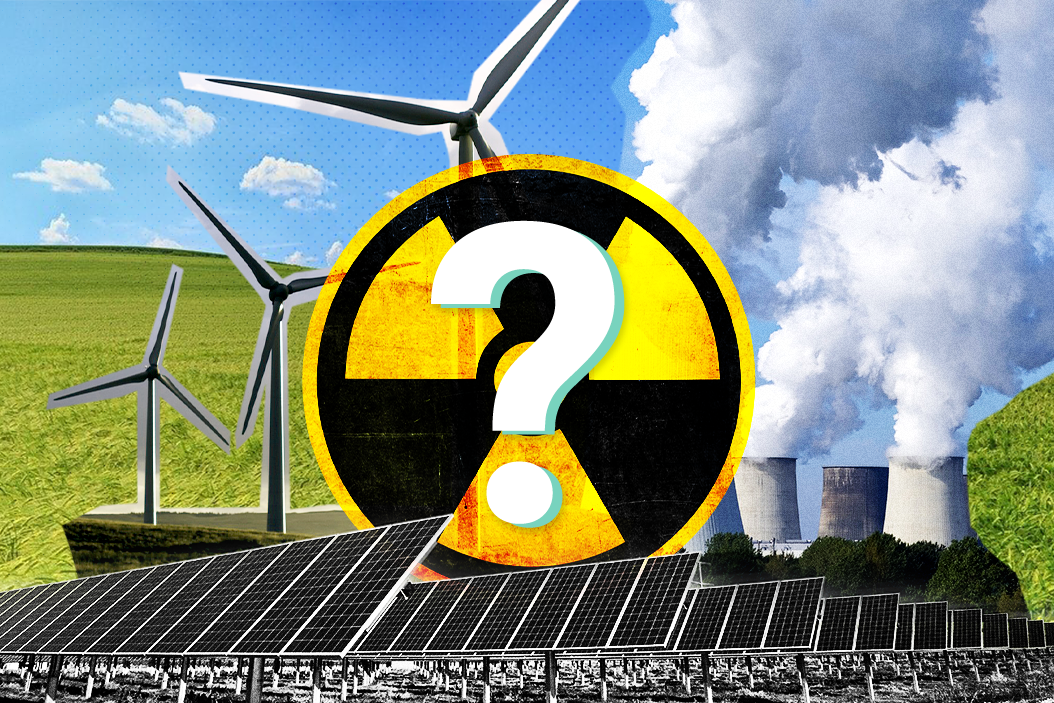Ten years ago this week, a powerful earthquake off the coast of eastern Japan triggered a tsunami that destroyed the Fukushima nuclear plant, resulting in the world's worst nuclear disaster since Chernobyl in 1986. A decade and dozens of decommissioned reactors later, nuclear energy still supplies about 10 percent of global electricity, but its future remains uncertain.
As more countries pledge to curb emissions to mitigate climate change, nuclear could serve as a clean(ish) and reliable source of energy. But investing more in nuclear comes with tradeoffs.
Nuclear is greener than you think. It's not renewable like solar or wind, but nuclear's direct carbon dioxide emissions output is zero. Over its life cycle, a nuclear plant produces about the same volume of indirect emissions per unit of electricity (mainly to extract and process uranium, to build and operate the facilities, and store the waste) as wind, and one-third of solar. That helps explain why the use of nuclear power is not ruled out entirely by US proponents of the Green New Deal.
There's also the unintended environmental cost of shutting down. When the Fukushima disaster prompted Germany to take most of its nuclear plants offline, it was soon forced to fire up its coal plants, leading to 1,100 additional deathsper year from air pollution. Scientists estimate that not replacing all nuclear plants with fossil fuels by 2050 could save more than seven million lives.
Moreover, while solar and wind are both intermittent and therefore depend on energy storage, nuclear is as reliable as oil, gas, and coal. The International Energy Agency projects that the world could meet its Paris climate goals by 2040 by raising nuclear's share of the global energy mix to 15 percent and investing a lot more in cheaper, cleaner nuclear plants.
But nuclear is also very expensive, and understandably unpopular. Generating electricity from nuclear now costs about $112-189 per megawatt hour, much more than solar ($36-44) and wind ($29-56). Also, while the total lifetime cost of building and running a plant has declined for solar and wind over the last decade, it has increased for nuclear, so poorer countries can't afford it. Finally, the average construction time for a single plant is nearly 10 years — dangerously slow for the urgent battle against climate change.
The other major concern is safety. To be fair, unlike Chernobyl the Fukushima accident didn't kill anyone from radiation, and was caused not by a chain of human errors but a 9.0 magnitude earthquake, a catastrophe on a scale that even the safety-conscious Japanese hadn't planned for. But they did build the site near the coast in a known quake-prone area, and they didn't protect the reactors as well as European countries did after a French plant flooded in 1999.
More importantly, Fukushima spurred a global popular backlash against nuclear power that has yet to dissipate. More than 49 percent of Japanese people said a year ago that they want nuclear power to be discontinued. Roughly the same percentage of Americans now have an unfavorable view of nuclear, making it the most unpopular source of energy in the US after coal.
So, who's still building new nuclear plants, and why?Russia, for now the dominant global player in the industry, is exporting its nuclear technology to countries with relatively friendly governments like those in Hungary, Iran, and Turkey. But China is catching up fast, and has plans to both finance and construct new plants in places as diverse as Pakistan, South Africa… and the UK.
Moscow and Beijing — the latter betting big on nuclear as part of its bid to go carbon-neutral by 2050 — are competing to fill the void briefly created by the US. (The Trump administration reversed Obama-era bans on US international public lenders financing nuclear projects abroad, although President Joe Biden has yet to say whether he'll stay the course.)
If the Americans stage a nuclear export comeback, things could get interesting. On the one hand, US-built plants might be preferable for countries committed to net zero emissions that can afford them. On the other hand, some of those same nations have popular environmentalist parties that want to abolish nuclear energy, and many locals will protest nuclear construction in their backyard.
A tough choice. Weighing the risks of a costly, unpopular source of energy against the benefits of emissions-free electricity will provoke debate in many countries. But as the drive for climate action becomes more urgent, governments are running out of time to make their choice.
